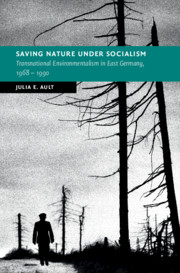Book contents
- Saving Nature Under Socialism
- New Studies in European History
- Saving Nature Under Socialism
- Copyright page
- Dedication
- Contents
- Figures
- Acknowledgments
- Abbreviations
- Introduction
- Chapter 1 Balancing Economy and Ecology: Building toward Environmental Protection, 1945–1970
- Chapter 2 “Socialist Environmentalism”: Between Ideal and Practice, 1971–1982
- Chapter 3 Church, Faith, and Nature: An Alternative Environmentalism, 1972–1983
- Chapter 4 Intertwining Environmentalisms: Transboundary Pollution and Protest in Central Europe
- Chapter 5 Coming Out From Behind the Cloud: Environmentalism after Chernobyl
- Chapter 6 Growing Together? The Environment in the Collapse of Communism
- Conclusion
- Bibliography
- Index
Chapter 4 - Intertwining Environmentalisms: Transboundary Pollution and Protest in Central Europe
Published online by Cambridge University Press: 30 August 2021
- Saving Nature Under Socialism
- New Studies in European History
- Saving Nature Under Socialism
- Copyright page
- Dedication
- Contents
- Figures
- Acknowledgments
- Abbreviations
- Introduction
- Chapter 1 Balancing Economy and Ecology: Building toward Environmental Protection, 1945–1970
- Chapter 2 “Socialist Environmentalism”: Between Ideal and Practice, 1971–1982
- Chapter 3 Church, Faith, and Nature: An Alternative Environmentalism, 1972–1983
- Chapter 4 Intertwining Environmentalisms: Transboundary Pollution and Protest in Central Europe
- Chapter 5 Coming Out From Behind the Cloud: Environmentalism after Chernobyl
- Chapter 6 Growing Together? The Environment in the Collapse of Communism
- Conclusion
- Bibliography
- Index
Summary
Chapter four emphasizes the GDR’s position as an ecological link between east and west as well as an environmental hazard to its neighbors. Moving geographically from west to east, this chapter traces the entangled evolution of policies among the GDR and its neighbors in addition to protest within the GDR. Growing dismay over transboundary pollution redoubled West German efforts to negotiate with the GDR. Moreover, frustration over pollution and the classification of data in the GDR come from both official channels and Church-based circles. Resentment over worsening conditions emerged across the country and from an array of individuals. Lastly, environmental protest reawakened in Poland as the communist party embraced Soviet reforms after 1985, making it an obvious node for activism in the Soviet bloc. These phenomena put pressure on the GDR. Denunciations of pollution heightened a sense of crisis that defied political divisions and revealed ecological interdependence.
Keywords
- Type
- Chapter
- Information
- Saving Nature Under SocialismTransnational Environmentalism in East Germany, 1968 – 1990, pp. 129 - 164Publisher: Cambridge University PressPrint publication year: 2021

